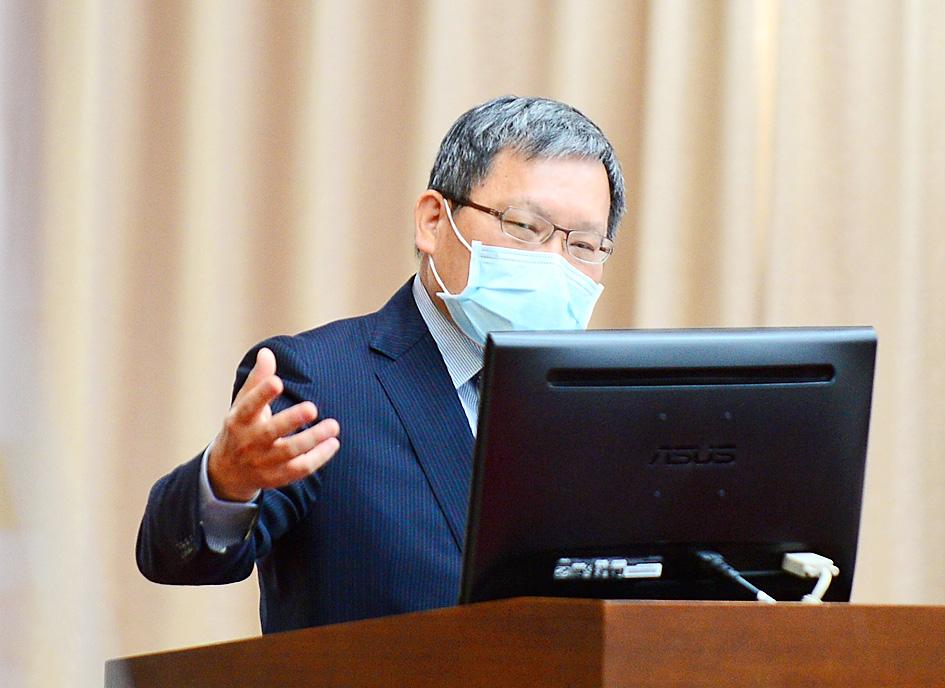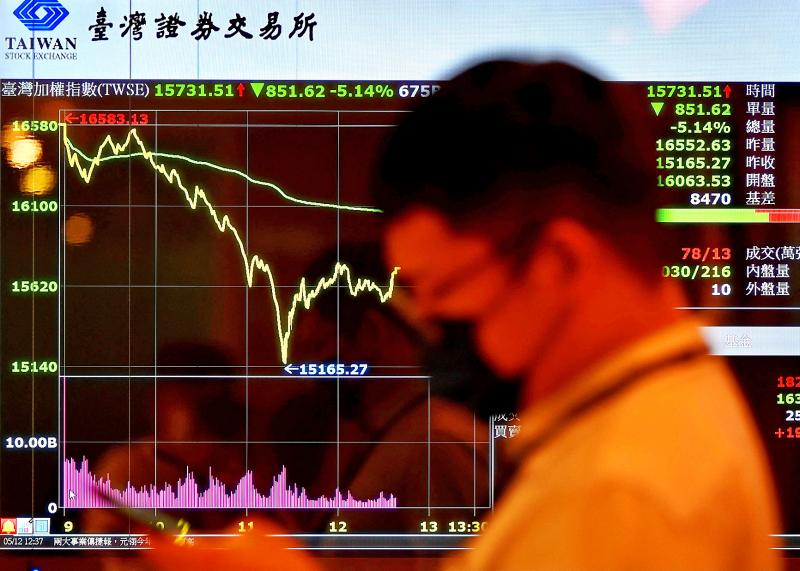The TAIEX yesterday sank by 680.76 points, or 4.11 percent, to close at 15,902.37 points, the second-
largest one-day drop after a fall of 696 points on Jan. 30 last year, amid concern over the rising number of local COVID-19 infections, analysts said.
The weighted index, which closed at 16,583.13 points on Tuesday, opened down and lost 300 points in the first 15 minutes of trading, before climbing to 16,550 points at 9:46am, Taiwan Stock Exchange (TWSE) data showed.

Photo: Wang Yi-sung, Taipei Times
However, it lost its footing again, plunging 1,400 points to 15,165.27 points at 11:25am. That represented a drop of 9 percent — the largest intraday fall in decades, TWSE data showed.
The TAIEX recovered on the back of a rebound in several big-cap shares, including Taiwan Semiconductor Manufacturing Co’s (TSMC, 台積電) and United Microelectronics Corp (UMC, 聯電), before ending the day at 15,902.37 points.
It was the second straight day that the index closed down, after plummeting 3.79 percent on Tuesday.

Photo: Sam Yeh, AFP
Turnover totaled NT$772.772 billion (US$27.64 billion), with foreign institutional investors selling a net NT$12.17 billion of shares, TWSE data showed.
More than 900 stocks retreated, including 140 whose shares sank by the daily cap of 10 percent, Prudential Financial Securities Investment Trust Enterprise Co (保德信投信) said in a statement.
“The stock market was comparatively calm in the first trading hour, but crashed later. Why? I think that was because some investors panicked amid speculation that Taiwan might raise its COVID-19 alert to level 3 soon and might even impose lockdowns,” Hua Nan Securities Investment Management Co (華南投顧) chairman David Chu (儲祥生) said by telephone.
Moreover, many investors faced margin calls by brokers to cover losses in their stock accounts, but as some could not come up with the money to meet the minimum requirement, brokers were forced to sell off their positions, which exacerbated the market’s decline, Chu said.
The level of margin debt totaled NT$257 billion on Tuesday, down by NT$12.7 billion from Monday and the most since October 2018, Chu said.
As the margin debt was expected to further drop yesterday amid the market rout, it is likely to lead to a bigger unwinding of leverage, he added.
The National Stabilization Fund Committee might convene a meeting soon to respond to the ongoing market rout amid rising COVID-19 infections and as global technology shares retreat, Minister of Finance Su Jain-rong (蘇建榮) said.
“The committee is likely to convene extraordinary meetings very soon in the face of panic selloffs of local shares,” Su said at a meeting of the legislature’s Finance Committee, with lawmakers across party lines asking if the government has measures in place to respond to the crisis.
The ministry has exchanged views on the issue with Vice Premier Shen Jong-chin (沈榮津), the head of the fund committee, Su said, while declining to give clear-cut answers.
The NT$500 billion stabilization fund last intervened on March 19 last year, when the TAIEX fell to near the 8,500-point mark, as global markets crashed after major countries imposed lockdowns to tackle the COVID-19 pandemic.
The fund exited the market in October last year, after the local bourse rallied to record highs, thanks to global rush orders for electronics used in laptops, tablets, TVs and other tech products.
A later report by the committee revealed that it shored up the local bourse by buying shares of TSMC, MediaTek Inc (聯發科), Hon Hai Precision Industry Co (鴻海精密) and other heavyweights.
The fund walked away with a handsome profit.
Asked whether it is time for the fund to step in now, Su said the committee has the final say and he is only one of the panelists.
Deputy Minister of Finance Frank Juan (阮清華), the fund’s executive secretary, called the panic selloffs unnecessary, adding that Taiwan’s economy expanded 8.16 percent in the first quarter and is gathering further steam moving forward.
Juan said that government agencies “are joining forces and will soon rein in resurgent local virus infections.”
The committee is closely watching local stock exchange, but the most urgent thing for investors now is to stay calm, he said.
Exports, a critical GDP component, surged more than 30 percent year-on-year last month, and should continue to grow by double-digit percentage points this month and beyond, he added.

MULTIFACETED: A task force has analyzed possible scenarios and created responses to assist domestic industries in dealing with US tariffs, the economics minister said The Executive Yuan is tomorrow to announce countermeasures to US President Donald Trump’s planned reciprocal tariffs, although the details of the plan would not be made public until Monday next week, Minister of Economic Affairs J.W. Kuo (郭智輝) said yesterday. The Cabinet established an economic and trade task force in November last year to deal with US trade and tariff related issues, Kuo told reporters outside the legislature in Taipei. The task force has been analyzing and evaluating all kinds of scenarios to identify suitable responses and determine how best to assist domestic industries in managing the effects of Trump’s tariffs, he

TIGHT-LIPPED: UMC said it had no merger plans at the moment, after Nikkei Asia reported that the firm and GlobalFoundries were considering restarting merger talks United Microelectronics Corp (UMC, 聯電), the world’s No. 4 contract chipmaker, yesterday launched a new US$5 billion 12-inch chip factory in Singapore as part of its latest effort to diversify its manufacturing footprint amid growing geopolitical risks. The new factory, adjacent to UMC’s existing Singapore fab in the Pasir Res Wafer Fab Park, is scheduled to enter volume production next year, utilizing mature 22-nanometer and 28-nanometer process technologies, UMC said in a statement. The company plans to invest US$5 billion during the first phase of the new fab, which would have an installed capacity of 30,000 12-inch wafers per month, it said. The

Taiwan’s official purchasing managers’ index (PMI) last month rose 0.2 percentage points to 54.2, in a second consecutive month of expansion, thanks to front-loading demand intended to avoid potential US tariff hikes, the Chung-Hua Institution for Economic Research (CIER, 中華經濟研究院) said yesterday. While short-term demand appeared robust, uncertainties rose due to US President Donald Trump’s unpredictable trade policy, CIER president Lien Hsien-ming (連賢明) told a news conference in Taipei. Taiwan’s economy this year would be characterized by high-level fluctuations and the volatility would be wilder than most expect, Lien said Demand for electronics, particularly semiconductors, continues to benefit from US technology giants’ effort

‘SWASTICAR’: Tesla CEO Elon Musk’s close association with Donald Trump has prompted opponents to brand him a ‘Nazi’ and resulted in a dramatic drop in sales Demonstrators descended on Tesla Inc dealerships across the US, and in Europe and Canada on Saturday to protest company chief Elon Musk, who has amassed extraordinary power as a top adviser to US President Donald Trump. Waving signs with messages such as “Musk is stealing our money” and “Reclaim our country,” the protests largely took place peacefully following fiery episodes of vandalism on Tesla vehicles, dealerships and other facilities in recent weeks that US officials have denounced as terrorism. Hundreds rallied on Saturday outside the Tesla dealership in Manhattan. Some blasted Musk, the world’s richest man, while others demanded the shuttering of his